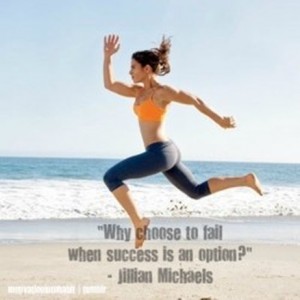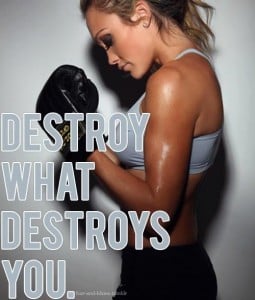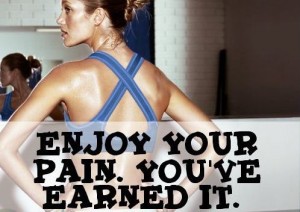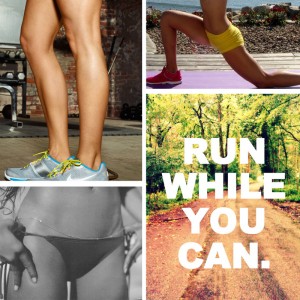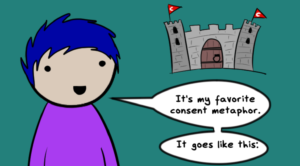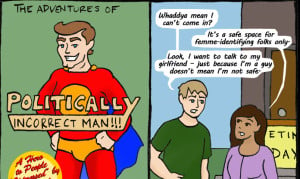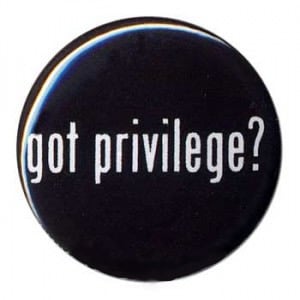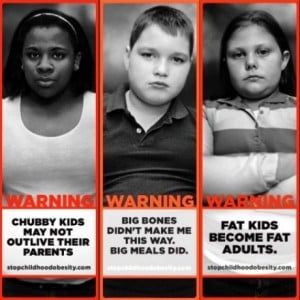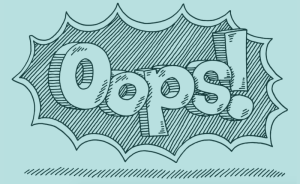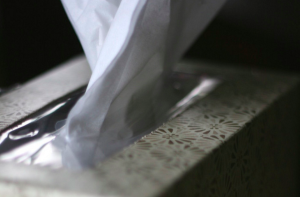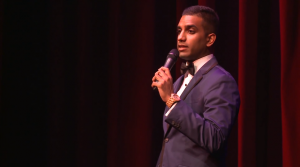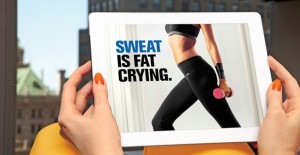
Source: Glamour
Recently, Virgie spent the afternoon talking with Jen at the Winnipeg Free Press about her Lose Hate Not Weight philosophy and lots of other body image related topics. It is around that New-Year’s-resolution-driven-fat-panic-diet-spiking time of year, after all.
And then Jen introduced her to something that she had never heard of – and, coincidentally, something that Melissa just so happens to loathe with all of the passion in her.
It’s called fitspo, which is short for fitspiration.
Everyday Feminism has published pieces on the fitspo phenomenon before, like this cross-post from Libero Network giving the ludicrous lowdown and Melissa’s article – The Good, the Bad, and the Ugly – on when fitspo turns from kind-of-alright to totally dangerous, but just to refresh your memory:
According to Glamour, “Fitspo refers to images and words that women post with the purpose of inspiring themselves and others to live a fit, active life.”
Supposedly.
The problem that we see with fitspo, though, is that it looks too much like a not-so-cleverly-disguised thinspo.
After all, the fitspo trend arose after thinspiration (or #thinspo) images were banned from social media sites like Tumblr and Instagram because of the images’ consistent portrayal of very thin (and some would argue, unhealthily thin) women with faux-motivational quotes about how “Your stomach isn’t growling, it’s applauding.”
But even Virgie (whose research into the trend was brief) can tell you that fitspo images don’t seem much different.
If anything, all they do is shift the perspective a little bit.
Instead of mantras like “I know it hurts, but starving works,” fitstpo pushes ideas like “Strong Is the New Skinny.” Or, you know, they say this:
At the end of the day, we may be trading bones in for muscle tone, but one thing we’re not ridding ourselves of is body hatred and fear of fat.
And these ideas that our bodies just aren’t good enough the way that they are is still dangerous.
In looking particularly at images that have text, Virgie has identified five major themes that were consistent in fitspo messages that we want to argue are totally ruining your day, our culture, and (perhaps most importantly) ice cream:
1. Failure and Bootstrapping
Dear JilMike, you call the absence of a six-pack failure; I call it cake-is-delicious.
Regardless, by virtue of not having a six-pack, you’re still not a failure. Hell, that would indicate that both of us are failures, and we’re far too arrogant (and, you know, successful) ever to agree with that.
But implicit in this if-you-don’t-look-like-this-it’s-because-you’re-not-trying-hard-enough mentality is the dangerously deceptive myth of bootstrapping.
For those new to the concept of bootstrapping, it’s the belief that we are each completely independently responsible for our individual success or failure. And that if you fail, it’s because you didn’t try hard enough.
If only this were actually the case in life! If only whenever we put forth a little bit of effort, we could have anything that we wanted!
One notable example of this being a big, old lie? The economy.
And selling this idea to you in the form of body-shaming is no different. It’s still a lie.
Can diet and exercise have an effect on your body? Sure. But more so do genes. The same way that your education and ambition can affect your upward mobility, but not nearly as much as your starting point will.
Shaming yourself into believing that the burden of your physical self is a direct result of your lack of drive and ambition? Sounds like psychological warfare to us – which doesn’t fit our definitions of “health” and “inspiration.”
2. Death and Destruction
Like the first image (the oh-so-inspirational one about fat funerals), there is a distinct necropolitical bent to some of fitspo’s messaging.
Essentially, what that means is that these messages push the idea that Death is a much more powerful force than Life, and that in order to persevere through the latter, you must face the former.
According to political scientist Achille Mbembe: “Contemporary forms of subjugation of life to the power of death (necropolitics) profoundly reconfigure the relations among resistance, sacrifice, and terror.”
And ain’t that the truth.
If we only consider “resistance, sacrifice, and terror” through the lens of “Life and Death,” we’re really not getting the full picture, and we’re limiting our ability to see reality clearly.
Writers like Naomi Wolf, for instance, have discussed the ways in which sexism seeks to imbue women with a desire for our own destruction.
And you can see that everywhere, particularly in the ways that women are taught to take up less space. Eat less, weigh less, stay quiet, cross your legs. The patriarchy is the strongest when women are at their weakest.
If fitspitation is pushing you to weaken yourself (by using false-hope messaging of gaining strength), if it is literally and figuratively suggesting that you destroy yourself, that’s not power.
You don’t gain power through averting death. You gain it through perpetuating life.
3. Pain
This theme ties to the first and second themes and is based in the very WASP-y belief that nothing worth having – nothing respectable, anyway –comes without suffering.
And while it’s most certainly true that some of the goals that you’ve set for yourself may involve making sacrifices or pushing yourself to your limits, the “no pain, no gain” idea that you should willingly open yourself to agony is a scary one.
We see this trend in a lot of the socialization of women – that love is not worth having unless you need to fight nail and tooth for it first; that “he only teases you and pushes you because he likes you”; that first-time sex is supposed to be painful, but it’s just something you need to suffer through.
We teach women that pain is part of gain – that the two are inextricable.
Even growing up, Melissa recalls her mother telling her, whenever she was braiding her hair too tightly or plucking out eyebrow hairs too forcefully, “It hurts to be beautiful.”
And naturalizing pain – that is, saying that pain is a natural and inevitable condition of success – sets women up to be unhappy no matter what we do.
4. Ableism
Ableism is, in part, about creating anxiety about your physical abilities and equating disability with personal failure.
This image in particular uses our cultural anxiety about aging and loss of ability to convey that you have a limited timeframe during which you can actually achieve things, and that not using your body for intense exercise is something you will regret.
Beyond being ableist, that’s also just really manipulative.
The very idea that our bodies are “supposed” to be used in a certain way is problematic.
And don’t get us wrong – we’re not suggesting that the very idea of exercise is a problem or that our bodies don’t need physical activity to run well.
Rather, what we’re saying is that 1) it isn’t anyone’s business how we decide to use our own bodies, and 2) implying that bodies that aren’t being used in a certain way are somehow faulty assumes that all bodies perform the same way in the first place.
Helloooo, ablecentrism.
And anything that implies that it knows better about our bodies and our values does not “inspire” us to be “fit.”
5. Bullying
Maybe we’re in the minority, but we don’t like to make things – even inanimate things –cry. And last time we checked, that was called emotional abuse (or dacryphilia).
Of course, there’s anything kind of bullying going on here besides the implicit (and, honestly, ridiculous) idea that fat has the ability to cry: fat-shaming.
And at the end of the day, any type of media that promotes one type of body over another (and particularly with the fat body being subjugated) is fat-shaming.
And we’re just not here for that.
***
So, let’s recap. We don’t think that any of the following are inspiring:
- Failure and Bootstrapping
- Death and Destruction
- Pain
- Ableism
- Bullying
And to make matters worse, fitspiration images also create a psychological link between physical activity – which should be fun and pleasurable – with really awful outcomes and intentions.
One of the last things Jen (you remember, from the Winnipeg Free Press) and Virgie talked about was the ways that ironically, the diet and fitness industry actually creates the really negative relationship that people have with food and physical activity.
When you give foods (like cookies or kale) magical powers, you create a situation in which people will act irrationally and inauthentically around food.
When you endow physical activity and movement the magical powers of success and failure, you create a situation in which people will develop a really fraught relationship with movement of any kind.
We know that for us (even as body image activists), sometimes even going out for a walk – because it’s gorgeous outside and we just want to see some gorgeousness! – can trigger feelings of shame or goal-setting.
These feelings are not natural or innate; they are learned.
So, Fitspo, I’m sorry, but I’m going to have to say that you are anti-humanitarian, you are sexist, you are ableist, and you’re just a plain misnomer.
There ain’t no inspiration in suffering.
Want to discuss this further? Login to our online forum and start a post! If you’re not already registered as a forum user, please register first here.
Virgie Tovar, MA is a Contributing Writer for Everyday Feminism and the editor of the book, Hot & Heavy: Fierce Fat Girls on Life, Love and Fashion. Virgie is one of the nation’s leading experts and lecturers in the areas of fat discrimination and body image. She lives in San Francisco. Find her online atwww.virgietovar.com.
Melissa A. Fabello, Editor of Everyday Feminism, is a domestic violence prevention and sexuality educator, eating disorder and body image activist, and media literacy vlogger based out of Philadelphia. She enjoys rainy days, Jurassic Park, and the occasional Taylor Swift song and can be found on YouTube andTumblr. She holds a B.S. in English Education from Boston University and an M.Ed. in Human Sexuality from Widener University. She can be reached on Twitter @fyeahmfabello. Read her articles here and book her for speaking engagements here.
Search our 3000+ articles!
Read our articles about:
Our online racial justice training
Used by hundreds of universities, non-profits, and businesses.
Click to learn more



